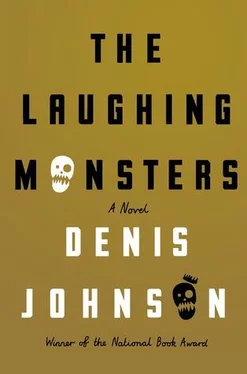Patrick thought he might spot his wife among them, so he said. Still paying out this line. I didn’t buy it.
We took our meals with everyone else. Officers and enlisted men ate together in a large Quonset along with civilian guests and Special Ops helicopter crews and detainees from NATO countries, of which Patrick and I were the only ones, the only people modeling red pajamas.
The Special Activities Division sees some sort of advantage, I think, in starting the questions when your fork is halfway to your mouth. Just grab you up, goodbye hamburger sandwich, and it’s off to the interrogator.
This one was new. And that was good.
* * *
We met in a Quonset hut, in an office with a desk, two aluminum dining chairs, and some empty cardboard boxes and a cardboard barrel of MREs I could have stood in up to my neck. “Meal Rammed in an Envelope,” he said. “Care to suck one down?” I declined. He served me black coffee. I could have chosen tea and milk.
I said, “Where’s Sergeant Stone today?”
“Sergeant Stone?”
“I don’t know if his name was Stone, but he certainly seemed to be made of it.”
“No sergeants here.”
“He never introduced himself. Neither did the civilian.”
“Under current regulations, that’s not a requirement.”
“But under the circumstances, it might be courteous.”
“Sure. Agreed.”
“So — who are you?”
“Let’s skip over the courtesies for now. Can I suggest we do that, without irritating the shit out of you?”
I was too irritated to answer.
He used a lot of motions getting a bag of tea into a cup. He seemed older than the first one, but in a way he looked younger, looked barbered and tailored, in dark trousers, a nice white shirt — I wouldn’t know silk, but it might have been — and cuff links. He looked the way I try to look.
He sat down facing me with our knees nearly touching. We observed each other’s manner of drinking from a cup.
“Captain Nair, I’d like your opinion.”
“I’m full of opinions.”
“Good. Well. In the fullness of your opinion — does all this you’ve been telling us the last couple of days sound like a desperate, unbelievable lie?”
I counted to three. “Yes.” Counted again. “Now can I ask you a question?” Silence. “Where are you going?”
“I’m not going anywhere.”
“Why not?”
He sipped his tea.
“In case I’m telling the truth.”
He drained his cup. “Or in case you stop lying. More coffee?”
“No, thanks.”
He stood and set our cups aside and pulled his chair behind his desk and sat down. “I’ve reviewed all your written material,” he said, opening a drawer and taking out a manila file folder.
“Yes.”
He laid it apart before him. Printed e-mails, and my long note to Tina. “The Congolese Army threw you quite a party.”
“Yes.”
“Stressful.”
“Yes.”
He spent a few minutes perusing the pages of the letter, pages crusty from sweat and tears. “Sometimes I wish I had the balls to say this stuff. I don’t even have the balls to think it.”
I didn’t reply.
“Another way of putting it is that we’re seeing a lot of anger, and that’s not characteristic of our expectations. No matter what the level of stress.”
“I don’t deny it — lately I’ve been out of sorts.”
“Sure, that’s another way to put it. If you think all this is funny.”
“Well, I was dispatched to this region on an assignment, and now two weeks later I’m being dealt with as some kind of terrorist.”
“I think you’re regarded as absent from your assignment.”
“But I’m not absent, I’m present. Here I am, waiting to get back to work.”
“A Special Forces attaché goes AWOL, starts making alarming noises about enriched uranium. You’re sent to make contact, deliver one report that you’ve done so, and you immediately go silent.” He raised a printed e-mail by two corners and faced it toward me. “Until this maniac salvo.”
“I’ve been pursuing my assignment according to my best judgment.”
“And this meltdown message? ‘Cunts’ and such?”
“Everybody likes to quote that one.”
“I know. It’s very compelling. But why did you send it?”
“Theater,” I said.
“Really.”
“I’m dealing with some rogue Mossad agents. I had to make it look good.”
“A rogue Mossad agent, you’re saying, was sitting beside you while you transmitted insults to your NATO colleagues.”
“Didn’t the last guy tape our interviews? Yes? Have you heard them?”
“I’ve read highlights of the transcript.”
“Then if you want the details, you can read the whole thing. Don’t ask me to rehash.”
“And all of this, the crazy transmission, tossing your commo equipment, getting rounded up by the Congolese Army, all of this was in fulfillment of your superiors’ request that you keep a close eye on this fellow. And you say your mission’s momentum has declined sharply. And you propose a strategy to reboot.”
“Yes.”
He sat back with an empty-handed shrug. Shaking his head. Smiling. “Hard to know what to make of all this.”
“I want to ask about Davidia St. Claire.”
“On that subject I’ve got nothing to share with you. I mean really — I just don’t know. But she’s not in any trouble. I’d be more concerned about the one you sent the notes to. Tina? Is that her name?”
“You can read the name right there. I can read it, upside down.”
“This would be Tina Huntington. Works for us in Amsterdam.”
“Who’s you?”
“Who — me?”
“You say us. Who’s us?”
We both laughed.
“We the Americans, from the USA,” he said.
“Right. She works for you. You’re NATO?”
“Nope. I’m a US naval attaché.”
“Rank?”
“I’m attached. Not in. Just attached.”
“So you don’t need an ocean.”
“I have an ocean. I’m actually assigned to a ship.”
“In the Indian Ocean? African Atlantic?”
“Well, it moves around. It has propellers.”
“A carrier?”
“Naw. A command ship. Floating office complex. Just about a luxury liner. USSOCOM.”
“I don’t know what that is.”
“USSOCOM? US Special Operations Command. The ship is the regional command center.”
“For this region.”
“Yes.”
“Meaning — DR Congo? East Africa?”
“For AFRICOM. Africa. The whole continent.”
I felt, suddenly, in love. I leaned closer to study his face. “Who are you?”
“I’m the person who can deal.”
“You still don’t have a name?”
“The name I have is Susan Rice.”
“You’re not black enough to be Susan Rice.”
“Plus, she’s a woman.”
“I was getting round to that.”
“I’m the closest thing to Susan Rice.”
She was the current national security advisor in the White House. The queen, in other words, of the secrets and the dark.
He placed his hands on the desk before him. He liked this part. “Well, Captain Nair, you’ve rubbed the right lantern.”
* * *
Patrick Roux and I sat on our sandbag wall observing a gang of men creating more sandbags — not all men, actually. We often saw women wearing US uniforms. And of course we saw women among the white-garbed African prisoners. Never any kind of female civilian. Never Davidia.
In the motor lot I counted twenty-two Nissan pickups with canopy shells. One dozen Humvees. Four Stryker fighting vehicles, each worth millions. The helicopter hangar probably housed a chopper big enough to devour them all.
I said to Patrick, “This was more amusing when it was science fiction.”
Читать дальше












